|
|
|
 |
 Other
Books By This Author
Other
Books By This Author
|
 |
 Sanctuary:
A Story of American Conscience and Law
in Collision (Weidenfeld & Nicolson,
1988) Sanctuary:
A Story of American Conscience and Law
in Collision (Weidenfeld & Nicolson,
1988)
Sanctuary is the story of an American
community's courageous response to a
human crisis. It describes how a handful
of people in Arizona in the 1980's,
led by a Quaker rancher, a Presbyterian
minister, and a Catholic nun, among
others, offered help to hundreds of
people fleeing death squads and civil
war in Central America. Supporters of
the Sanctuary movement set up a modern-day
Underground Railroad, smuggling Central
American refugees across the Mexican
border into Tuscon, where they received
shelter and safe passage from area churches.
They persisted in defiance of the Reagan
Administration's refusal to grant refugee
status to Central Americans. The government
responded by sending spies into several
churches, and indicting eleven people,
most of them ministers or lay church
workers. Sanctuary tells this dramatic
story from its beginning in the desert
to its conclusion in a court room, highlighting
a cast of character's no novelist could
invent.
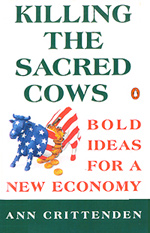 Killing
the Sacred Cows: Bold Ideas for a New
Economy (Pengiun Books, 1993) Killing
the Sacred Cows: Bold Ideas for a New
Economy (Pengiun Books, 1993)
A collection of essays suggesting unconventional
reforms on the most pressing economic
issues, including welfare, education,
housing, and taxation. The book was
written during the Presidential election
of 1992, when revival of the domestic
economy was the most pressing national
issue. "Like Sleeping Beauty,"
Crittenden writes in her introduction,
"people were waking up and asking,
'Where am I? What happened? Where's
my health insurance? Where's my pension?
Where's my bank? How is my kid going
to college?"'
In proposing solutions to the economic
recession that gripped the country in
the early 1990's, Crittenden drew upon
the research of think tanks and policy
institutes, and interviews with scholars,
businessmen, financiers, politicians,
activists, and ordinary citizens. She
discovered that the best ideas were
often those that did not fit neatly
within either of the traditional liberal
or conservative approaches. "The
either-or categories of 'private enterprise'
and 'public sector' are passe,"
she wrote; "the economic reality
is totally mixed."

|
|
 |
|
|
|
 |


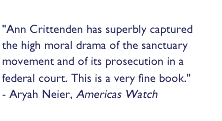
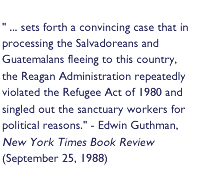
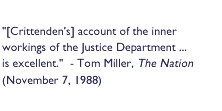
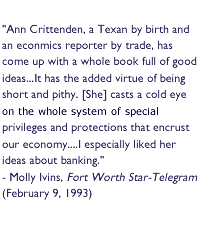
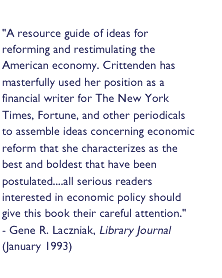
|
 |
|
|
|

